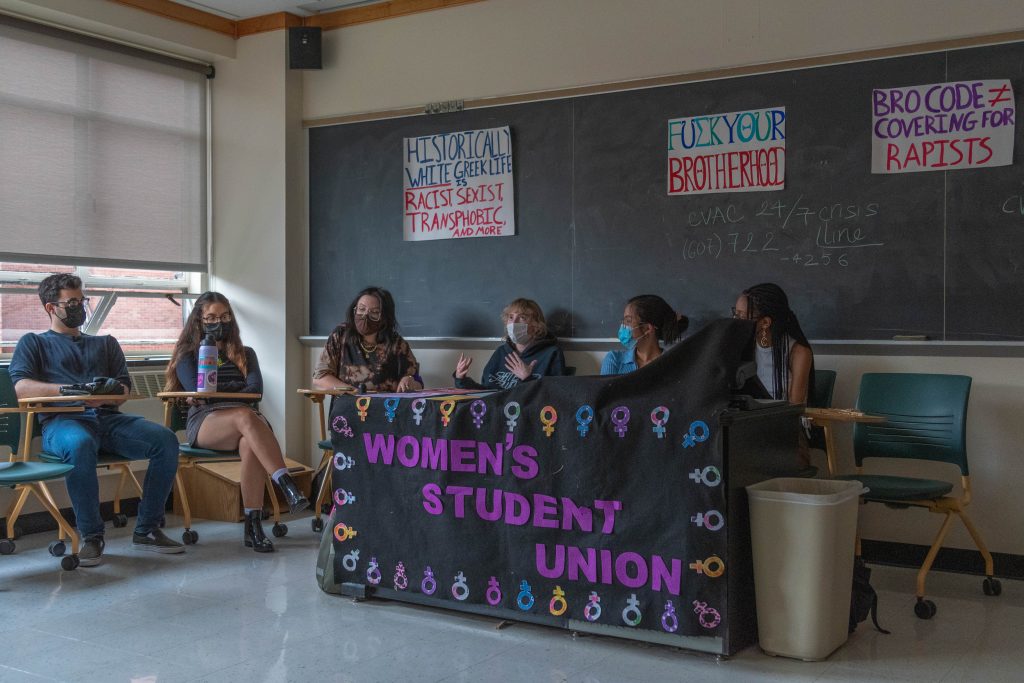
On Thursday, Sept. 23, the Women’s Student Union (WSU) held a rally for the abolishment of Greek life on Binghamton University’s campus. This event was one point of action the group made during the week of Sept. 19 to express its objections to Greek life organizations.
The idea for the rally was partially inspired by the Instagram account @shareyourstorybing, an account dedicated to providing a platform for survivors of sexual assault and violence as well as known personal accounts of abuse. Elizabeth Kamerman, WSU treasurer and a senior majoring in environmental studies, said WSU decided it was time to take action.
“I think the culture of Greek life at [BU] is so strong,” Kamerman said. “With those experiences [on @shareyourstorybing] being shared and the events of the past year, I think now it has come up, and people are thinking about it more. It is a cause we care about a lot.”
WSU decided on the week of Sept. 19 in order to reach people before rushing and full Greek life participation began. Abigail Cornelia, president of WSU and a senior double-majoring in English and philosophy, politics and law, said she was surprised at the level of interest in the cause.
“We have definitely been getting a good amount of engagement,” Cornelia said. “This is a cause I believe in really heavily, but I also recognize it is probably not that popular on campus, but I will say that I have been surprised. While tabling, I definitely got some good faith interest.”
Though the rally was intended to be held outdoors on the Peace Quad, it was moved to Fine Arts Building classroom 244 due to inclement weather. Inside the classroom, the walls were decorated with different posters with slogans such as “Bro code ≠ covering for rapists” and “Hazing = hivemind.” In addition, the number for the Crime Victims Assistance Center (CVAC) was written on the blackboard as a resource for those who need it.
Prior to the event, WSU shared multiple posts and infographics over Instagram detailing harms attributed to Greek life, including 10 pillars created by the Instagram page @abolish_greeklife. These posts discuss relationships between Greek life and racism, interpersonal violence, classism and more.
“We are all here today because the harms that Greek life causes and the ills of it don’t only exist in the abstract,” Cornelia said at the start of the rally. “It harms real students here at this University, and that is why it is so imperative that we represent a collective against it.”
Throughout the rally, members of the E-Board took turns reading demands they had sent to the University, including abolishing Greek life and holding fraternity and sorority members accountable for any harmful actions. They also shared personal stories about their own experiences and opened the floor for participants to do the same.
Despite an anti-Greek life stance, the WSU turned their attention away from multicultural Greek life institutions and stated their focus as “historically white Greek life organizations” in their Instagram posts. The WSU said they believe multicultural Greek life organizations were created as a way to foster an important community and safe space for minorities — like Black or Jewish students — and that these organizations should not be critiqued by outside parties. Troi McKenzie, historian apprentice for WSU and a junior majoring in psychology affirmed this aspect of the rally in a statement she wrote for the organization.
“We want to make it clear that these conversations about the harm that is perpetuated inside of multicultural [Greek life] is not a conversation that people outside of those organizations should be having,” McKenzie wrote. “We feel that this is not a conversation that should be led by us, as most of the members of WSU are not involved in those communities or not involved in the inner workings of those cultures.”
Looking back on the week’s events, Cornelia said the events were impactful no matter the attendance.
“Even if no one came to the meeting, even if we were just sitting in the room alone, it is so important to let people know that there is an organized effort against Greek life,” Cornelia said.
If you or someone you know is the victim of sexual assault, harassment or anything related, the CVAC or the Violence, Abuse and Rape Crisis Center (VARCC) are available resources. CVAC is located at 377 Robinson St. in Binghamton, and can be reached by phone at (607) 722-4256 for a 24/7 crisis support line or by text at (607) 725-8196. CVAC services are also available at the VARCC office, which is located on the third floor of Old Johnson Hall or can be reached by phone at (607) 777-3010.


